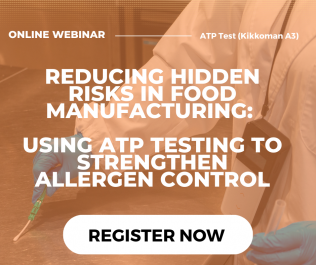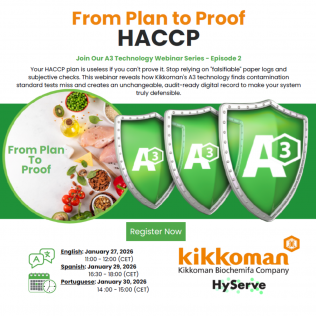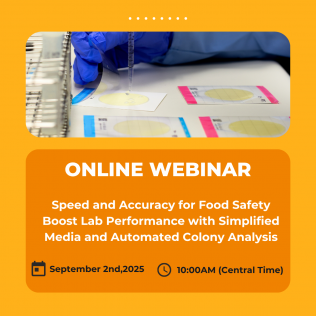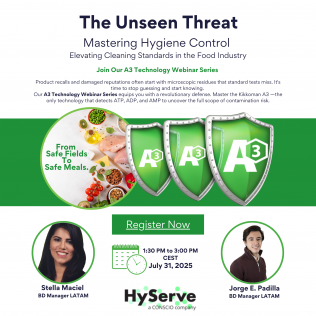
Seminar information

Closed seminar

Event Overview
HyServe will be hosting an upcoming webinar as part of the A3 Webinar Series.
Dates and Times (CET):
- English Session: Jan 27, 2026 | 11:00-12:00
- Spanish Session: January 29, 2026 | 16:30 – 18:00
- Portuguese Session: January 30, 2026 | 14:00 – 15:00
Are you confident your HACCP plan can move from a binder on a shelf to verifiable, audit-ready proof in seconds?
Managing food safety with manual logs and subjective visual checks is time-consuming, prone to errors, and difficult to defend during an audit. When a deviation occurs, how quickly can you "close the loop" to prove your corrective action was effective? Join our upcoming webinar to learn how to automate and strengthen your entire food safety program. We will explore how Kikkoman's A3 technology and the Lumitester App directly support the most critical "action" principles of HACCP—Monitoring, Corrective Actions, and Verification.
What You Will Learn
In this webinar, we will cover:
- Why Superior Sensitivity Matters: How Kikkoman's A3 technology (measuring ATP+ADP+AMP) finds contamination from processed or heated foods that standard ATP-only tests miss.
- Automate Monitoring (Principle 5): Move from subjective "visual checks" to objective, numerical RLU data for a consistent standard of "clean".
- "Close the Loop" on Corrective Actions (Principle 6): Use real-time results to trigger an immediate corrective action (re-clean) and instantly re-test to verify it was successful.
- Achieve Total Accountability (Principle 7): Eliminate "messy, error-prone, and falsifiable" paper logs. See how every test is automatically saved to the cloud with the operator ID, time, date, and location, creating an unchangeable, audit-ready digital record.
- Verify Your System: Use the app's data to instantly identify sanitation trends, validate cleaning procedures, and prove your HACCP plan is working effectively.
Target Audience
- Quality Assurance Managers
- HACCP Coordinators
- Food Safety Professionals
looking to save time, reduce risk, and create a truly defensible food safety system.
Speaker Information
- Jorge E. Padilla
- Stella Maciel

- Event date
- 2025.09.03
- Product
- Easy Plate (AC, EC, CC, SA, YM-R,EB,AC-R)
- Venue
- Webinar

- Event date
- 2025.07.31
- Product
- ATP Test (Kikkoman A3): LuciPac A3 Surface, LuciPac A3 Water, LuciPac A3 Pre-moisten
- Venue
- Microsoft Teams
